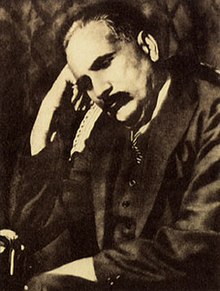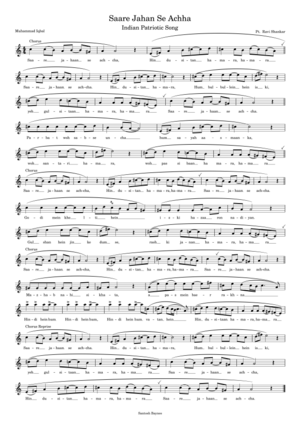Sare Jahan se Accha
| Sāre Jahān se Accha | |
|---|---|
| by Muhammad Iqbal | |
| Original title | Tarānah-e-Hindi |
| First published in | Ittehad |
| Country | British India |
| Language | Urdu |
| Form | Ghazal |
| Publication date | 16 August 1904 |


"Sāre Jahān se Accha",[a] originally known as "Tarānah-e-Hindi",[b] is a children's Hindustani patriotic song written by poet Muhammad Iqbal in the ghazal style of Urdu poetry.[c] The poem was published in the weekly journal Ittehad on 16 August 1904.[1] Publicly recited by Iqbal the following year at Government College, Lahore, British India (now in Pakistan) it quickly became an anthem of opposition to the British Raj. The song, an ode to Hindustan—the land comprising present-day Bangladesh, India and Pakistan, was later published in 1924 in the Urdu book Bang-e-Dara.[2]
By 1910, Iqbal's worldview had changed to become global and Islamic. In a new song for children, "Tarānah-e-Milli," written in the same metre, he changed the homeland from "Hindustan" to the "whole world". In 1930, in his presidential address to the Muslim League annual conference in Allahabad, he supported a separate nation-state in the Muslim-majority areas of the subcontinent, an idea that inspired the creation of Pakistan.
"Sāre Jahān se Accha" has remained popular in India.[d] An abridged version is sung and played frequently as a patriotic song and as a marching song of the Indian Armed Forces.[3] The most popular musical composition is that of sitar maestro Ravi Shankar.
Lyrics
[edit]The original poem is in the Hindustani language, a pluricentric language of two standard varities: Hindi and Urdu. In India, where Hindi is an official language, the text of the poem is usually rendered in the Devanagari script. Meanwhile, in Pakistan, where Urdu is an official language there, the text is officially written in the Nastaliq script.
| Nastaliq | Devanagari | Latin script | English translation |
|---|---|---|---|
سارے جہاں سے اچھا ہندوستاں ہمارا |
सारे जहाँ से अच्छा हिन्दोसिताँ हमारा |
Sāre jahañ se acchā, Hindositañ[4] hamāra |
Better than the entire world, is our Hindustan, |
Composition
[edit]Iqbal was a lecturer at the Government College, Lahore at that time, and was invited by a student Lala Har Dayal to preside over a function. Instead of delivering a speech, Iqbal sang "Sāre Jahān se Accha". The song, in addition to embodying yearning and attachment to the land of Hindustan, expressed "cultural memory" and had an elegiac quality. In 1905, the 27-year-old Iqbal viewed the future society of the subcontinent as both a pluralistic and composite Hindu-Muslim culture. Later that year he left for Europe for a three-year sojourn that was to transform him into an Islamic philosopher and a visionary of a future Islamic society.[2]
Iqbal's transformation and "Tarānah-e-Milli"
[edit]In 1910, Iqbal wrote another song for children, "Tarānah-e-Milli" ("Anthem of the Religious Community"), which was composed in the same metre and rhyme scheme as "Sāre Jahān se Accha", but which renounced much of the sentiment of the earlier song.[6] The sixth stanza of "Sāre Jahān se Accha", which is often quoted as proof of Iqbal's secular outlook:
Mazhab nahiñ sikhāta āpas meñ bair rakhna |
Religion teacheth us not to bear ill-will among ourselves |
contrasted significantly with the first stanza of "Tarānah-e-Milli" (1910) reads:[6]
Cīn-o-Arab hamāra, Hindūstañ hamāra |
Central Asia[7] and Arabia are ours, Hindustan is ours |
Iqbal's world view had now changed; it had become both global and Islamic. Instead of singing of Hindustan, "our homeland," the new song proclaimed that "our homeland is the whole world."[8] Two decades later, in his presidential address to the Muslim League annual conference in Allahabad in 1930, he supported a separate nation-state in the Muslim majority areas of the sub-continent, an idea that inspired the creation of Pakistan.[9]
Popularity in India
[edit]- "Sāre Jahān se Accha" has remained popular in India for nearly a century. Mahatma Gandhi is said to have sung it over a hundred times when he was imprisoned at Yerawada Jail in Pune in the 1930s.[10]
- In the 1930s and 1940s, it was sung to a slower tune. In 1945, while working in Mumbai with the Indian People's Theatre Association (IPTA), the sitarist Pandit Ravi Shankar was asked to compose the music for the K. A. Abbas film Dharti Ke Lal and the Chetan Anand movie Neecha Nagar. During this time, Ravi Shankar was asked to compose music for the song "Sāre Jahān se Accha". In an interview in 2009 with Shekhar Gupta, Ravi Shankar recounts that he felt that the existing tune was too slow and sad. To give it a more inspiring impact, he set it to a stronger tune which is today the popular tune of this song, which they then tried out as a group song.[11] It was later recorded by the singer Lata Mangeshkar to a 3rd altogether different tune. The first, third, fourth and sixth stanzas of the song became an unofficial national song in India,[1] and the Ravi Shankar version was adopted as the official quick march of the Indian Armed Forces.[12] This arrangement as marching tune of this song was made by Antsher Lobo.[citation needed]
- Rakesh Sharma, the first Indian astronaut, employed the first line of the song in 1984 to describe to then prime minister Indira Gandhi how India appeared from outer space.[13]
- In his inaugural speech, the former prime minister of India Manmohan Singh quoted this poem at his first press conference after becoming the Prime Minister.[10]
- The song is popular in India in schools as a patriotic song, sung during morning assemblies, and as a marching song for the Indian armed forces, played during public events and parades.[2] It is played by the Armed forces Massed Bands each year for the Indian Independence Day, Republic Day and at the culmination of Beating the Retreat.[14]
See also
[edit]- Index of Muhammad Iqbal–related articles
- Iqbal bibliography
- "Amar Shonar Bangla"
- "Qaumi Taranah"
- "Jana Gana Mana"
- "Vande Mataram"
- "Qadam Qadam Baṛhāye Ja"
- National Pledge (India)
Notes and references
[edit]Notes
[edit]- ^ Urdu: سارے جہاں/جہان سے اچھا, Hindi: सारे जहाँ/जहान से अच्छा, pronounced [ˈsaːɾeˑ dʒɐˈɦãː(n) seˑ ˈɐtʃːʰaˑ]; lit. 'Better Than the Entire World'
- ^ ترانۂ ہندی / तराना-ए-हिंदी
- ^ "'Taranah-e Hindi' (1904) was explicitly written as a patriotic song for children; Iqbal also composed a number of others meant for children, but this one has always been the most popular. This little ghazal ..."[1]
- ^ This little ghazal, composed by the man widely considered to be the philosophical father of Pakistan, is now extremely popular—but only in India."[1]
Citations
[edit]- ^ a b c d Pritchett, Frances. 2000. "Tarana-e-Hindi and Taranah-e-Milli: A Study in Contrasts." Columbia University Department of South Asian Studies.
- ^ a b c "Saare Jahan Se Accha: Facts about the song and its creator". India Today. 21 April 2016. Archived from the original on 23 January 2017. Retrieved 17 October 2016.
- ^ Imam, Sharjeel (6 July 2016). "Sare Jahan Se Acha: The Idea of India in Early 20th Century Urdu Poetry". The Wire. Retrieved 17 October 2016.
- ^ a b c "Here they are not to be pronounced as their usual pronunciation Hindūstāṉ and gu-lis-tāṉ, respectively, but Hindositāṉ and gul-si-tāṉ, to suit the meter." From: Pritchett, F. (2004). "Tarānah-i-Hindi" Columbia University, Department of South Asian Studies.
- ^ Pronounced "tiray" to suit the meter, in contrast to the usual "tayray." From: Pritchett, F. (2004). "Taraanah-i-Hindii" Columbia University, Department of South Asian Studies.
- ^ a b c Iqbal: Tarana-e-Milli, 1910. Columbia University, Department of South Asian Studies.
- ^ Although "Cīn" refers to China in modern Urdu, during Iqbal's day, it referred to Central Asia, coextensive with historical Turkestan. See also: Iqbal: Tarana-e-Milli, 1910. Columbia University, Department of South Asian Studies.
- ^ Pritchett, Frances. 2000. Tarana-e-Hindi and Tarana-e-Milli: A Close Comparison. Columbia University Department of South Asian Studies.
- ^ A look at Iqbal; The Sunday Tribune – May 28, 2006
- ^ a b Times of India: Saare Jahan Se..., it's 100 now
- ^ Gupta, Shekhar (5 December 2009). "Walk the talk - Interview with Pandit Ravi Shankar". NDTV. Retrieved 12 August 2015.
- ^ Indian Military Marches Archived 2 March 2009 at the Wayback Machine.
- ^ India Empowered to Me Is: Saare Jahan Se Achcha, the home of world citizens
- ^ "Indian tunes to set mood at 'Beating Retreat' today". The Tribune. 29 January 2018. Retrieved 5 June 2018.
External links
[edit]- "Tarana-e-Hindi at Rabia Memorial School, Fatehpur Mau (UP) India". YouTube. 23 January 2013. (Children singing the complete lyrics of the song.)
